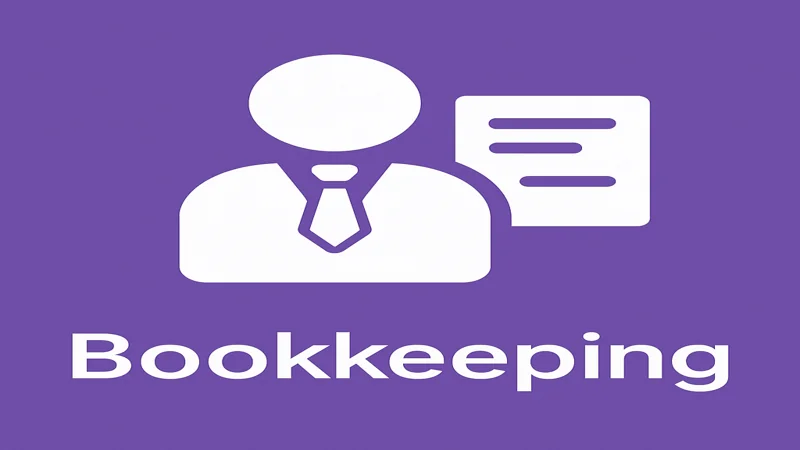The Benefits of Bookkeeping Services in the USA for Small Businesses
For small businesses in the USA, managing finances can often feel overwhelming. Bookkeeping is an essential aspect of running a successful business, but not every entrepreneur has the time or expertise to manage it effectively. That’s where bookkeeping services come into play, offering a wealth of benefits that can help your business thrive.
First and foremost, hiring a professional bookkeeping service allows you to focus on what you do best—running your business. Bookkeepers specialize in financial management, which means they handle your financial data more efficiently and accurately than someone who may lack the necessary training or experience. This gives you more time to concentrate on growing your company, serving customers, and brainstorming new ideas.
Accuracy is another significant benefit of using bookkeeping services. Mistakes in financial records can be costly. They lead to bad decisions, problems with the IRS, or even missed opportunities for funding. Bookkeepers are trained to spot discrepancies and rectify them, reducing the likelihood of errors. With detailed and accurate records, you’ll have a clear overview of your business’s financial status, allowing for better strategic planning.
Bookkeeping services also provide valuable insights into your business’s financial health. They can generate reports that detail key financial metrics, such as cash flow, profit margins, and expenses. Armed with this information, you can make informed decisions about where to cut costs, where to invest, and how to adjust your business strategy going forward. Understanding your finances more comprehensively empowers you to take proactive measures that can foster growth.
Another important aspect is compliance. The tax landscape is complex, with numerous laws and regulations to navigate. Bookkeeping services stay updated on the latest changes and ensure your business remains compliant. This reduces your risk of facing penalties associated with improper tax filings. You won’t have to worry about late fees or losing money due to mistakes, which liberates you to focus on your business operations.
Many small business owners worry about overhead costs when considering hiring bookkeeping services. However, outsourcing your bookkeeping can often be more cost-effective than maintaining an in-house team. You will save on hiring, training, and employee benefits costs while receiving expert services on an as-needed basis. This flexibility means that you only pay for the services you require when you need them, making it easier to manage your budget.
Security is another critical factor in bookkeeping. Handling sensitive financial information comes with risks, including the potential for data breaches. Professional bookkeeping services use advanced security measures to protect your data. They have systems in place to safeguard your financial information and ensure it remains confidential, giving you peace of mind that your sensitive information is in safe hands.
The benefits of bookkeeping services in the USA for small businesses are numerous. From enhancing accuracy and allowing you to focus on your core business functions, to providing insightful financial analysis and ensuring compliance with tax regulations, there are many reasons to consider outsourcing this vital task. Below is a quick list of the key benefits you can gain by using bookkeeping services:
- More time to focus on business growth
- Increased accuracy in financial records
- Valuable financial insights for better decision-making
- Ensured compliance with tax laws
- Cost savings compared to hiring in-house
- Enhanced data security for sensitive information
If you are considering bookkeeping services for your small business, numerous companies can meet your needs. Firms like BKS Accounting, CPA.com, and Simplicity Bookkeeping provide tailored solutions that could help your business thrive while keeping your financial records in excellent shape.
Investing in professional bookkeeping services is not just about keeping your books in order; it is an investment in the future of your business. By allowing experts to handle your finances, you can focus on innovation, customer service, and overall growth.
How to Choose the Right Bookkeeping Service for Your Needs
Choosing the right bookkeeping service in the USA can feel overwhelming. With numerous options available, making an informed decision is crucial for your business’s financial health. Here’s how you can navigate this process effectively.
Understand Your Business Needs
Before you start looking for a bookkeeping service, you need to evaluate your specific requirements. Consider the following:
- Business Size: Are you a small startup, a growing company, or a large corporation? Your size influences the level of detail you need.
- Industry: Some industries have unique financial requirements. Choose a service familiar with your sector.
- Volume of Transactions: A high volume of sales means you may need more sophisticated services.
Research Available Services
After assessing your needs, begin your search for bookkeeping services. Look for providers who specialize in your area. Here’s where to start:
- Online Reviews: Websites like Yelp and Trustpilot can help you find reputable services based on customer experiences.
- Professional Recommendations: Consult with your accountant or other business owners for their recommendations.
- Industry Associations: Organizations related to your field often list trusted service providers.
Check Qualifications and Experience
Review the qualifications of potential bookkeeping services. Ensure they have the necessary certifications, such as Certified Public Accountant (CPA) or bookkeeping certification. Additionally, consider the following:
- Experience: How long has the service been in business? Experience often translates into reliability.
- Specializations: Does the service have experience in your industry? This is vital for understanding specific financial matters.
- Software Knowledge: Are they familiar with the accounting software you currently use or plan to use, such as QuickBooks or Xero?
Evaluate Their Services
Not all bookkeeping services offer the same range of services. Determine what services you need and see who provides them:
- Basic Bookkeeping: Ensures accurate financial records.
- Tax Preparation: Helps with end-of-year filings and tax-saving strategies.
- Financial Reporting: Creates reports that help you understand your business’s financial position.
- Payroll Processing: Manages employee payments and records more accurately.
Consider Communication and Accessibility
A good bookkeeping service should prioritize clear communication. Ask potential providers how they communicate with clients. Some points to consider include:
- Response Time: How quickly do they respond to queries?
- Availability: Are they available for meetings when you need them?
- Methods of Communication: Do they prefer emails, calls, or video meetings? Choose a style that works for you.
Analyze Pricing Models
Price is a critical aspect. Be wary of services that offer significantly low rates, as this could indicate inadequate service quality. Consider:
- Flat Fees vs. Hourly Rates: Some services may charge a flat rate, while others charge by the hour. Understand your budget and what fits best.
- Additional Costs: Be aware of any hidden fees for additional services or reports.
Schedule a Consultation
Meet with your shortlisted bookkeeping services. This consultation allows you to gauge their understanding of your needs and see if you can establish a rapport. Trust your instincts; a good fit is essential for successful collaboration.
Choosing the right bookkeeping service in the USA requires careful consideration. Understand your business’s unique needs, research potential services, and evaluate their qualifications, communication, and pricing. This comprehensive approach will help you find a bookkeeping partner that aligns well with your business goals.
For additional resources on bookkeeping services, consider visiting AICPA and explore professional insights and guidelines to help you make better financial decisions.
Common Mistakes to Avoid When Using Bookkeeping Services
Utilizing bookkeeping services can be a game-changer for many businesses. However, there are some common pitfalls that can lead to frustration and inefficiency. Being aware of these mistakes can help you maximize the benefits of these services. Here are key areas to focus on to enhance your experience.
Not Communicating Effectively
Clear communication is vital when working with a bookkeeping service. If you don’t express your expectations or share important information, misunderstandings can arise. Ensure you outline your specific needs and preferences from the start. Regular check-ins can strengthen this partnership. Rather than waiting for things to go wrong, be proactive in your communication.
Focusing Solely on Cost
While it’s essential to find affordable services, choosing a bookkeeping provider only based on price can lead to subpar quality. Take the time to evaluate the services offered and find a balance between cost and quality. In many cases, investing a little more upfront can save you time and money in the long run. Research various bookkeeping services to ensure you get the best value for your investment. Resources like American Bookkeepers Association provide insight on service quality.
Overlooking the Importance of Software Compatibility
The tools used by your bookkeeping service should be compatible with your existing systems. Failure to ensure this compatibility can lead to data silos and inefficient workflows. Ask the service provider what software they employ and whether it can seamlessly integrate with your operations. This can prevent wasted time and errors in data entries. Look into platforms like QuickBooks or Xero, which are commonly used by many bookkeeping firms.
Ignoring Proper Record-Keeping Practices
Even when hiring a bookkeeping service, maintaining accurate records is your responsibility. Neglecting this aspect can lead to problems. Keep all receipts and financial documents organized and accessible. Implementing a systematic way to track these documents will benefit both you and your bookkeeping service. Consider using cloud storage solutions for easy access. Platforms like Google Drive help keep records organized.
Not Asking Questions
Failing to ask questions can lead to misconceptions or confusion regarding financial processes. It is crucial to understand the bookkeeping practices and asks for clarification whenever needed. A good bookkeeping service will welcome your questions and provide clear answers. This will ensure you are on the same page and can better understand your financial standing.
Neglecting to Review Financial Reports
Your bookkeeping service will generate various financial documents, including profit and loss statements or balance sheets. Not reviewing these reports regularly can cause you to lose track of your financial health. Set aside time to analyze these reports and discuss them with your bookkeeping service. This will empower you to make informed decisions and take the necessary actions for improvement.
Failing to Update Your Service as Your Business Grows
As your business expands, your bookkeeping needs may change. It’s essential to assess and adjust your service accordingly. If your bookkeeping service cannot meet your evolving requirements, you may need to consider a different provider. Regularly evaluate your needs so you can find a bookkeeping service that can grow with you.
By staying mindful of these common mistakes, you can build a productive relationship with your bookkeeping service. Establishing effective communication, focusing on quality, ensuring compatibility, and actively managing your records will set you up for success. Know that services like National Association of Small Business can guide you in avoiding common accounting pitfalls. Engage actively and learn about your financial tools. Doing so will allow you to maximize the benefits of going the outsourced bookkeeping route.
The Role of Technology in Modern Bookkeeping Services
In today’s fast-paced business environment, technology plays a pivotal role in transforming bookkeeping services across the USA. Modern accountants and bookkeeping firms are increasingly relying on innovative solutions to manage financial records more efficiently while ensuring accuracy and compliance. These tools not only streamline processes but also provide invaluable insights into financial health, helping businesses make informed decisions.
Cloud-Based Accounting Software
One of the most significant technological advancements in bookkeeping is the rise of cloud-based accounting software. Programs like QuickBooks Online, Xero, and FreshBooks allow businesses to access financial data anytime, anywhere. With cloud accounting, you can:
- Reduce the need for physical storage solutions.
- Facilitate real-time collaboration with your accountant.
- Access your financial information securely from various devices.
The convenience offered by such platforms is a game-changer for small to medium-sized businesses, enabling them to focus on growth rather than administrative tasks.
Automated Data Entry
Automation is another critical element in modern bookkeeping services. Thanks to Optical Character Recognition (OCR) technology, data entry can be completed with incredible speed and accuracy. This technology can scan invoices and receipts, extracting pertinent information automatically. As a result, businesses significantly reduce the time spent on manual data entry, minimizing human error and freeing employees to engage in more strategic tasks. Automation features in software allow for:
- Instant receipt scanning and storage.
- Automatic categorization of expenses.
- Real-time financial reporting.
Mobile Applications
Mobile technology has created new opportunities for bookkeeping services. Many accounting software providers offer mobile applications, allowing business owners to manage their finances while on the go. You can easily capture expenses, send invoices, and even monitor financial health from your smartphone. These applications enable you to:
- Stay updated on cash flow.
- Receive push notifications for overdue invoices.
- Manage your business finances without being tied to your desk.
This level of accessibility empowers business owners to make timely decisions and respond quickly to financial situations.
Data Analytics and Reporting
Data analytics has revolutionized how businesses interpret financial information. Modern bookkeeping services are utilizing sophisticated analytics tools to generate comprehensive reports that provide deep insights into spending patterns and revenue streams. This can help you identify areas for improvement and optimize operations. Some benefits of data analytics include:
- Understanding customer behavior and purchasing trends.
- Predicting future revenue based on historical data.
- Assessing the financial risks and opportunities of new ventures.
Enhanced Security Features
With the increasing amount of financial data being processed electronically, enhanced security features have become essential in bookkeeping services. Cloud-based platforms utilize advanced encryption and multifactor authentication to safeguard sensitive information. This provides peace of mind, knowing that your financial records are protected against data breaches and cyber threats.
Integrations and APIs
Integration capabilities with other business software—such as Customer Relationship Management (CRM) systems and e-commerce platforms—are becoming increasingly important. Many bookkeeping services now offer APIs that allow seamless integration with other applications. This means:
- Improved data synchronization across platforms.
- Reduced time spent on manual updates.
- Added functionality tailored to specific business needs.
The shift toward technology-driven bookkeeping services in the USA is not just a trend; it is a fundamental evolution of how businesses manage their finances. By leveraging these advancements, you can increase efficiency, enhance accuracy, and make data-driven decisions in real time.
For more comprehensive insights on bookkeeping and accounting trends, you can explore resources from American Bookkeepers Association and AICPA. These organizations provide valuable content to keep you informed about the latest in bookkeeping services and technologies.
Understanding the Cost Structure of Bookkeeping Services in the USA
In today’s fast-paced business environment, understanding the cost structure of bookkeeping services in the USA is crucial for small and medium-sized enterprises. Many business owners need to grasp what they are truly paying for when they hire bookkeeping professionals. The costs can vary widely, and it’s essential to know the factors that influence these charges.
Factors Influencing the Cost of Bookkeeping Services
Several key factors contribute to the pricing of bookkeeping services:
- Business Size: Larger businesses generally require more comprehensive bookkeeping which can drive costs up.
- Service Complexity: Basic bookkeeping tasks will cost less than those involving payroll, taxes, or specialized reports.
- Location: Rates can vary significantly from one region to another in the USA, with urban areas often charging higher fees.
- Frequency of Services: Weekly, monthly, or quarterly services will affect overall pricing, with regular services often leading to more competitive rates.
- Experience Level: More experienced bookkeepers may charge higher fees due to their expertise and the value they bring to your business.
Typical Pricing Models
Understanding the different pricing models used in the bookkeeping industry can help you better budget your expenses. Here are the most common models:
- Hourly Rate: Bookkeepers typically charge between $20 to $150 per hour, depending on their experience and the services provided.
- Flat Fee: Some bookkeepers offer a flat monthly rate, which usually ranges from $300 to $2,500 based on the services included.
- Project-Based Pricing: For one-off tasks, like setting up a bookkeeping system, you may be charged a set fee based on the estimated hours or work required.
Understanding Hidden Costs
When hiring a bookkeeping service, be aware of potential hidden costs that might not be immediately apparent. Here are some common examples:
- Onboarding Fees: Some services may charge a fee for setting up your bookkeeping system.
- Software Charges: If the bookkeeper uses specific software, the cost may be passed on to you.
- Additional Services: Services like payroll processing, tax filing, or financial consulting usually come at an extra cost.
Cost-Benefit Analysis
It’s important to weigh the costs against the benefits of hiring a bookkeeping service. Some advantages include:
- Time Savings: Hiring a professional allows you to focus on your business operations instead of spending hours managing finances.
- Accuracy: Experienced bookkeepers reduce the risk of errors that can lead to costly penalties or lost revenue.
- Financial Insight: Regular reports and analysis can help you make better financial decisions for your business’ future.
Before selecting a bookkeeping service, it’s essential to assess your needs. Understand how often you need services, the specific tasks you require help with, and what your budget is. This clarity will help you choose a service that aligns with your business goals.
When you’re ready to hire a bookkeeping service in the USA, consider researching local professionals through websites such as American Bookkeepers or National Association of State Boards of Accountancy (NASBA). These resources can provide valuable insights, helping you make an informed decision.
Knowing the cost structure of bookkeeping services in the USA can transform how you manage your business finances. With the right information, you can make decisions that will save you time and money while ensuring your books are accurate and up to date.
How Bookkeeping Services Can Improve Your Financial Health
Managing your finances can be challenging, especially if you’re running a business. Bookkeeping services can play a vital role in enhancing your financial health. Whether you’re a small business owner or managing a larger enterprise, professional bookkeeping offers countless benefits that can streamline your operations. By allowing experts to manage your financial records, you can focus on growing your business.
Understanding Bookkeeping Services
To appreciate how bookkeeping services can impact your financial health, it’s essential to understand what these services entail. Bookkeeping involves recording and organizing your income, expenses, and other financial transactions. Professional services typically provide accurate tracking of your financial data and ensure compliance with tax regulations. Companies offering these services often utilize specialized software to enhance accuracy and efficiency.
The Benefits of Using Professional Bookkeeping Services
Investing in professional bookkeeping services can lead to improved financial health in several ways:
- Accuracy in Financial Reporting: Bookkeeping services help maintain accurate financial records. Mistakes in data entry can lead to significant financial discrepancies. With experienced bookkeepers, you reduce the risk of errors that can negatively impact your business.
- Time Savings: Handling bookkeeping on your own can consume a lot of time. Hiring professionals allows you to focus on core business activities, such as marketing and customer service, while they manage your financial records.
- Insightful Financial Analysis: Bookkeeping services provide valuable insights into your financial health. Professional bookkeepers generate reports that highlight revenues, expenses, and profit margins. With these insights, you can make informed decisions for your business’s future.
- Tax Compliance: Keeping up with tax regulations can be daunting, especially with frequent changes. Professional bookkeeping services help you stay compliant with federal and state tax laws, minimizing the risk of penalties.
- Budgets and Forecasting: Bookkeeper professionals assist with budgeting and financial forecasting. They can help you create a financial plan that aligns with your business goals, allowing for better resource allocation.
How to Choose the Right Bookkeeping Service in the USA
When looking for bookkeeping services in the USA, consider the following factors:
- Experience and Expertise: Look for bookkeeping services with proven experience in your industry. Their familiarity with industry-specific regulations can be beneficial.
- Technology and Tools: Ensure the service uses up-to-date technology and tools. Cloud-based software can offer more accessibility and enhanced security for your financial data.
- Cost Structure: Evaluate the pricing models. Some bookkeeping services charge hourly, while others may offer flat rates. Choose a model that fits your budget while ensuring quality service.
- Customer Support: Good customer service is crucial. The bookkeeping service should be easily reachable for any inquiries or concerns.
Common Misconceptions About Bookkeeping Services
Many business owners still hold misconceptions about bookkeeping services that can hinder them from seeking help. For instance:
- It’s Only for Large Businesses: This is false. Small businesses can benefit greatly from professional bookkeeping, as it allows them to manage their finances more effectively.
- Bookkeeping is Just Data Entry: While data entry is a part of it, bookkeeping involves analysis and strategy that can drive your business forward.
Understanding these aspects can help you see the value of professional bookkeeping services. If you wish to improve your financial health, consider partnering with a reliable service provider.
For more information and resources about bookkeeping, you can visit AccountingProse or BKPR. These platforms offer insights and details about how bookkeeping services can substantially benefit your business.
By investing in a quality bookkeeping service, you’re making a strategic investment in your business’s future. Embrace the advantages and let professionals handle the numbers while you concentrate on what you do best—growing your business.
The Future of Bookkeeping Services: Trends to Watch in the USA
As businesses in the USA evolve, bookkeeping services are also changing to keep up with the demands of new technologies and client needs. In recent years, the emphasis has shifted significantly towards automated and cloud-based solutions that make managing financial data easier and more efficient. Here are some of the key trends shaping the future of bookkeeping services in the USA.
Increased Automation
Automation is one of the most significant trends affecting bookkeeping services today. With advancements in software and technology, many routine tasks can now be automated. This includes data entry, invoice generation, and payroll processing. Automation not only saves time but also reduces human error. As a result, businesses are increasingly looking for bookkeeping services that leverage these tools.
Cloud-Based Solutions
Cloud bookkeeping is rapidly becoming the norm. By using cloud technology, businesses can access their financial data anywhere, anytime. This flexibility is essential for companies that operate in multiple locations or require remote access. Bookkeeping services in the USA are adopting cloud solutions to offer their clients better accessibility and real-time reporting.
Integrated Financial Solutions
Bookkeeping services are moving towards integrated financial solutions that connect various aspects of a business’s financial life. This includes linking accounting software with payment systems, CRM, and inventory management tools. These integrations lead to better financial insights and a more streamlined workflow, allowing business owners to make informed decisions. Some popular integrated platforms include QuickBooks and Xero, which can offer seamless connectivity with various business applications.
Focus on Advisory Services
Today’s bookkeeping services are no longer just about crunching numbers. Many firms are shifting their focus to provide advisory services that help businesses grow. This includes strategic planning, financial forecasting, and tax advice. By offering these additional services, bookkeepers position themselves as trusted advisors rather than just number-crunchers. This shift is especially important as businesses seek comprehensive solutions that help them navigate financial challenges.
Data Security and Compliance
As threats to data security continue to grow, bookkeeping services must prioritize protecting client information. This means investing in secure software and adhering to compliance regulations. Clients are more aware of the importance of data security, making it crucial for bookkeeping firms to demonstrate their commitment to safeguarding sensitive financial data. Services that can guarantee robust security measures will be more appealing to clients.
Virtual Bookkeeping
The rise of virtual bookkeeping is another notable trend. Businesses are increasingly opting for virtual bookkeepers who work remotely rather than hiring in-house staff. This not only reduces overhead costs but also provides access to a broader talent pool. Virtual bookkeeping allows for flexibility and the ability to scale services based on a business’s needs.
Artificial Intelligence and Machine Learning
The integration of artificial intelligence (AI) and machine learning into bookkeeping services is on the horizon. These technologies can enhance accuracy and efficiency by predicting trends and automating repetitive tasks. By harnessing AI, bookkeepers can focus more on strategic planning and advisory roles, providing higher value to their clients.
Understanding Your Financial Health
With the increasing availability of data analytics tools, bookkeeping services can now provide clients with a clearer picture of their financial health. These tools help derive insights from financial data, enabling businesses to identify trends, forecast future performance, and manage budgets effectively. Transparency in financial reporting fosters trust and enhances client satisfaction.
As the landscape of bookkeeping services in the USA continues to evolve, staying ahead of these trends will be crucial for both service providers and businesses. Embracing technology, focusing on advisory roles, and prioritizing data security will create a more reliable and effective bookkeeping framework. Companies that leverage modern bookkeeping services will undoubtedly streamline their operations and improve their financial management.
For more insights into the future of bookkeeping services, visit American Bookkeepers and Entrepreneur to stay updated on industry innovations.
Conclusion
Selecting the right bookkeeping service can be a game-changer for small businesses across the USA. With the benefits of accurate financial tracking, increased efficiency, and improved financial health, it is essential to invest in the right support for your enterprise. As you’ve learned, choosing a service involves understanding your unique needs and knowing how to avoid common pitfalls, such as miscommunication or overlooking vital services.
Technology plays a pivotal role in this equation. With modern bookkeeping software and cloud solutions, businesses can access real-time financial data at their fingertips. This not only enhances transparency but also allows for more informed decision-making. Understanding the cost structure of these services is equally important. By knowing what to expect financially, you can plan better and avoid surprise expenses.
As you move forward, keep an eye on emerging trends in the bookkeeping industry. Automation, AI, and integrated accounting platforms are reshaping how businesses manage their finances, leading to more streamlined processes and better accuracy.
By leveraging these advances and maintaining awareness of best practices, you can significantly improve your financial health and ensure that your business remains on a path to growth. Whether you’re a startup or a long-established company, investing in a quality bookkeeping service tailored to your needs will pave the way for a more organized, financially sound future.
Helpful links for your next step
IRS Small Business and Self‑Employed Center for forms, due dates, and guides.
U.S. Small Business Administration finance guide for cash flow and loan tips.












